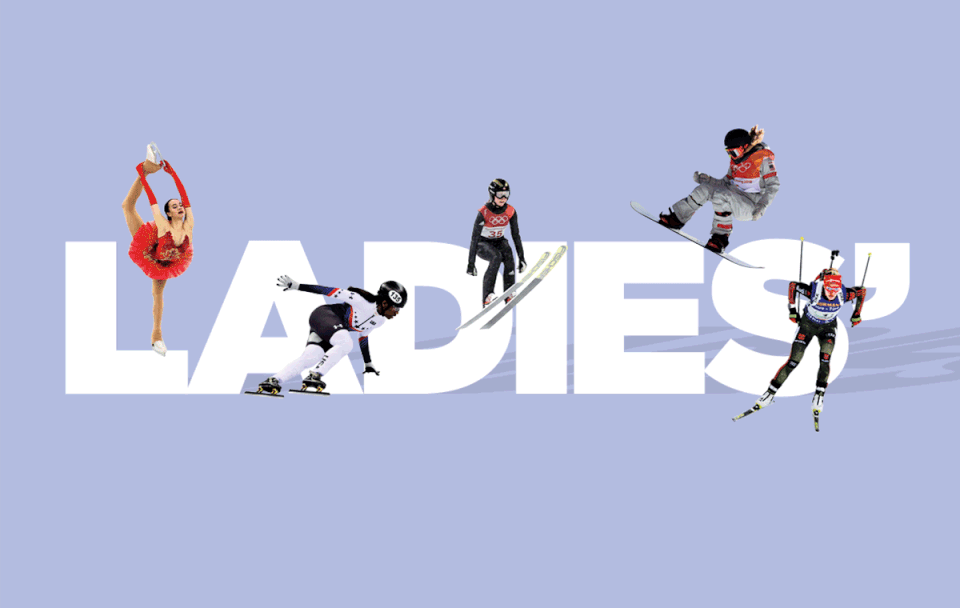Some Olympic sports are 'ladies,' some are 'women's': Here's why it matters
Being a woman or girl and watching the Olympics can be an incredibly empowering experience in 2018 — unless you pay close attention to the names of certain sporting events, and that some are for “ladies” only.
Take, for example, Alpine Skiing – Ladies’, Snowboard – Ladies’, and Speed Skating – Ladies’. As opposed to Biathlon – Women’s, Ice Hockey – Women’s , and Luge – Women’s.
Why the inconsistency of “ladies” vs. “women”?

A lady, according to the dictionary definition, is “a woman of superior social position,” “a woman of refinement and gentle manners,” or a “wife” or “girlfriend,” and it also an oft-used “courteous reference” to a woman, as in, “show the lady to a seat.” A “woman,” meanwhile, is “an adult female person.”
It’s pretty much a given at this point that using “lady” — sometimes used interchangeably with “woman” — is an old-school term that veers into sexist territory, except when it’s in the powerfully ironic hands of, say, Lady Gaga.
“Of course, lady sounds different in the mouth of a feminist woman than it does coming from a man,” noted Slate writer Katy Waldman recently. “We mostly judge guys who say lady to be condescending dinosaurs.”
And that can apply to the Olympics as well.
Yahoo Lifestyle contacted the Olympics media relations team to get answers about the use of “ladies” vs. “women” in the events, but was told to take it up with the governing bodies of the sports. “The International Federations are responsible for the rules and regulations of their sport,” the email notes. “We therefore suggest you contact the relevant Federations directly.”
Since the “ladies’” terminology refers strictly to skiing and skating events — a curious pattern noted by Only a Game writer Karen Given — Yahoo Lifestyle contacted the International Skating Union (ISU) and the International Ski Federation (FIS), which govern skating and skiing, respectively.
The ISU did not respond to Yahoo Lifestyle’s request (although a 2016 U.S. Figure Skating style guide, for what it’s worth, confirms that the “ladies” moniker is to be used, and without an apostrophe, because it’s a “descriptive phrase.”).
FIS spokesperson Jenny Wiedeke responded with a style guide (which notes that “FIS preferred use is “ladies, not women…”), offering the following explanation: “This has been the FIS language for decades. Most International Federations have similar style guides and in the majority of cases, those that use British English as their standard use the term ‘ladies,’ while American English federations use the term ‘women.’”
So why doesn’t the FIS use the appropriately parallel term for men’s sports, then, which would be “gentlemen’s”?
“In terms of gentlemen, I believe ‘men’s’ is the accepted shortcut for the term ‘Gentlemen’ and is accepted by both British English and American English standards,” Wiedeke says.
But feminist word sticklers would disagree — including those in the U.K., such as Professor Kath Woodward of the Open University, who commented on a 2016 BBC story about whether using “ladies” or “women” in sports matters.
“The use of ladies suggests a physical frailty and need for protection,” she said. “So, yes — I think it does matter.”
So does Lindsay Parks Pieper, assistant professor of sport management at Lynchburg College in Virginia and author of Sex Testing: Gender Policing in Women’s Sport. “I do think it matters, because ‘lady’ presents a certain type of image, and has certain gender, racial, and class connotations,” she tells Yahoo Lifestyle. “A lot of the governing bodies are definitely rooted in traditions — and what I would consider sexist traditions.”
Seeing “lady” attached to the name of a sport, Parks Pieper notes, might raise needlessly awkward questions for aspiring young athletes. “What should a lady look like?” for example. Also, she points out, “It’s upper-class women — ladies — who were able to participate in sports originally. It also tended to be white women vs. women of color. I think ladies definitely has a certain connotation. … It puts women in a secondary, or inferior, position right up front. And of course no one would be on board with ‘gentlemen’s’ over ‘men’s.”
The name, as it lands with young girls who aspire to be Olympic athletes themselves one day, could certainly be off-putting. “So it’s an important issue,” she adds, “and an example of a small, omnipresent, ubiquitous problem.”
Read more from Yahoo Lifestyle:
Meet Maame Biney, the first black woman to compete as a U.S. Olympic speed skater
Mirai Nagasu just landed a triple axel at the Olympics. Here’s how she did it.
What 11 Olympians do in the morning to start their days off right
What 11 Olympians packed to make PyeongChang feel a little more like home
This biathlete casually learned how to speak Korean before heading to the Olympics
Follow us on Instagram, Facebook, and Twitter for nonstop inspiration delivered fresh to your feed, every day.

